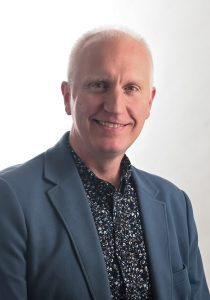Anyone who has questions about serving as an ABR volunteer should reach out to Mark Mullins, MD, PhD.
Dr. Mullins earned an ABR Lifetime Achievement Award this year after spending 15 highly productive years as a volunteer. His duties ran the spectrum: computer-based exam question writer, oral examiner, Angoff committee member, and Continuing Certification (MOC) Advisory Committee member.
His interest started when, as a new physician, he ran across the ABR’s mission.

“Early in practice, when I thought about the ABR and what it was there to do, I really liked the why,” Dr. Mullins said. “The why is to ascertain a level of excellence in radiology. I thought that volunteering was a good way to serve the community.”
When Dr. Mullins was going through the initial certification process as a resident at Massachusetts General Hospital, diagnostic radiology (DR) candidates had to pass three exams: two computer-based and one oral. His first oral examiner was Reed Dunnick, MD, a longtime ABR volunteer who recently served as DR associate executive director.
Dr. Dunnick was known for his no-nonsense approach as an oral examiner, prompting some residents to almost fear being assigned to him. Dr. Mullins fared well on the exam and later, he and Dr. Dunnick became friends as ABR volunteers.
“I saw him years later and said, ‘You examined me at the boards,’” Dr. Mullins said. “He said, ‘I hope I passed you.’”
Teaching Future Leaders
Dr. Mullins is a professor and vice chair for education for the department of radiology and imaging sciences and director of radiology medical student education at Emory’s Winship Cancer Institute. The fact that he is helping educate future diagnostic radiologists is no surprise to Dr. Dunnick.
“Few people understand the importance of the research needed to make data-based decisions, while at the same time appreciating the need to educate the next generation of radiologists,” Dr. Dunnick said. “Mark is one of them.”
Dr. Mullins started as an ABR volunteer in 2008 writing neuroradiology questions for initial certification exams. Two years later, he moved on to crafting questions for the DR Certifying Exam Essentials module. Much of his question-writing experience involves work on the Essentials. He estimates that he has written more than 500 computer-based exam questions.
“I always try to think of the audience that is going to take the question,” Dr. Mullins said.
Almost as important as that, he appreciates the experience he gains away from meeting rooms. Committees get together and talk over dinner after their work is done.
“It’s a good bonding experience and a chance to meet people,” he said. “I met so many people from so many different places in break rooms and during meals. It diversified my experience.”
As a volunteer, he prefers interacting with candidates as an oral examiner. He says he likes the “human reaction” examiners get when they talk with an examinee.
“I prefer examining because writing questions is deceptively challenging, so it’s exhausting in a different way,” Dr. Mullins said. “I get to see the payoff when I’m an examiner.”
Possible Comeback
With the ABR going back to an oral certifying exam for diagnostic radiology candidates in 2028, Dr. Mullins might end his volunteer break. When the organization starts recruiting for DR oral examiners in July 2026, he might want to be considered for one of the spots or try his hand at continuing certification questions.
Once a volunteer, always a volunteer.
“I could see coming back as an oral examiner or working with OLA at some point because I feel like I have a lot to give,” Dr. Mullins said.
His examiner-turned-friend would be happy to see him back among the ABR’s volunteers.
“When he accepts a duty or obligation, you know he will complete it,” Dr. Dunnick said. “In short, Mark is a mensch, one who has helped advance our field in many ways.”


